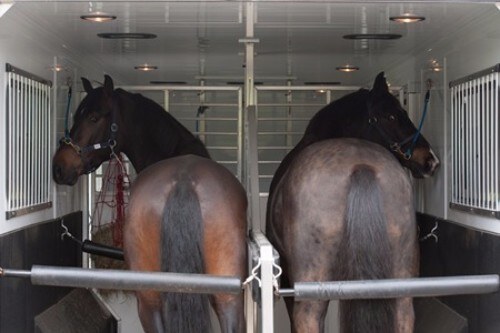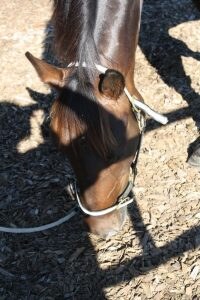This article was first posted just prior to the Horse of the Year show, a championship show that takes place in February (the peak of summer in NZ) for a wide range of equestrian sports. While it was written for that group, the concepts apply to any horse put in a truck, float, boat, or plane. If you are hoping to do something athletic with your horse when it arrives at its destination, this is for you.
While many people think a change is as good as a rest, horses, by nature, are homebodies. They like their own quiet surroundings, their own friends, and routine.
Researchers at the veterinary college at University of California, Davis (UC, Davis) have looked at several different classes of stress that affect horses in transport (you can read their research here), and another group from the University of Poland have measured oxidative stress which is a measure of inflammation that results from travel (read their research here). You can read their papers in their entirety for yourself, but I’m basically going to summarize some of their findings, as I think they will be important for everyone travelling to Horse of the Year this week.
Several different types and sources of stress appear to affect horses when they are travelling.
- They are removed from their homes, their routine, and their herd.
- Water tastes different, and they may be fed from different types of feeders, on a different time schedule.
- They will be in a confined space (truck, trailer, boat, or airplane), and they won’t be able to graze, at least while they are in transit. In fact, they may or may not get to eat at all, and water may only be offered occasionally. Certainly, feed and water consumption routines will be different, at best.
- They might be stuck in a public transport next to a horse they don’t know or in your own float next to one that they don’t really get along with that well.
- They might have to have their heads tied to prevent them biting their “friends”, and restricted head movement is another contributor to stress.
- For some older, arthritic horses, the overall lack of free movement can be painful and emotionally stressful too.
- While too little movement isn’t great, the flip side of the coin is that horses will have to constantly tense muscles to brace themselves to stay balanced and not fall over while you drive along New Zealand’s beautiful but winding roads. There will be almost constant noise and vibration, and temperatures and humidity will fluctuate.
- We had had a fabulous summer this year, and I’m certainly not complaining, but it could be pretty hot and humid for hauling your horse this weekend. The air coming through the truck/float may not be very fresh as it may contain vehicle exhaust, dust, or ammonia from urine in the stall.
Upon arrival at your HOY, there will be a degree of organized (hopefully) chaos. There will be trucks, people, and horses everywhere. While you may think it is a very social, interesting, and terribly fun situation, your horse will find all the strangeness, strangers, and general mayhem to be less then comfortable. They may not eat, drink, or rest normally upon arrival, and they may be more likely to colic. It may take a few days of rest to recover from the trip down, but they will have to work and compete almost as soon as they arrive in many cases. Once competition starts, they will be asked to do their very best several times in the week. For horses, travel to HOY may result in emotional stress and physical stress.

How Did Scientists Prove That Travel Is Stressful?
Physical markers of stress were measured in horses transported over a few hours, and these included the following:
- CK and AST elevations confirm muscle cell damage.
CK and AST are enzymes that are released from muscle cells when they are damaged, often by lactic acid. They are the same enzymes your veterinarian will check to confirm if your horse has tied-up. CK goes up within 2-8 hours of the episode of muscle cell damage, and it goes back down quite quickly too. AST takes longer to go up, needing about 12 hours. In tying-up, CK and AST might be over 1000 or even 2000, while normal values are around 250. In these studies, CK reached levels of about 800. Elevations in these enzymes were moderate, and proved significant muscle cell damage. - MDA, ROS (reactive oxygen species), and fibrinogen elevations confirm cell damage from oxidation and the inflammation that results.
These are molecules that are regularly measured to demonstrate the inflammatory response to oxidative stress or the oxidative damage itself. That sounds more complicated than it is.
Oxidative stress is the same thing as oxidative muscle cell damage. It occurs when exercising muscle cells produce little molecules called free radicals (ROS). Those little molecules cause inflammation and damage to the muscles that produced them, and that process is called oxidation, oxidative stress, or oxidative muscle cell damage. The Polish team found that MDA and fibrinogen were significantly elevated, and these are indicators of inflammation and oxidative stress. - Body temperature and White Blood Cell (WBC) changes demonstrate immune compromise.
Elevated body temperatures and low white blood cell counts were common features, and both of these are related to the suppression of the immune system at times of stress. - Dehydration and body weight losses confirm reduced feed consumption and either reduced water consumption or increased fluid losses.
Dehydration, as you might expect, was a feature, especially where horses were transported in warmer weather. It was thought to be related to the disruption in normal feed and water consumption patterns along with their response to heat. On average, the UC Davis group reported that horses lost 6% of their body weight due to reduced feed and water consumption in addition to dehydration. - Variations in heart rate and cortisol increases indicate hormonal and biological responses to emotional stress.
Cortisol, a hormone directly elevated at times of stress was found to be significantly increased as was the incidence of heart rate variability. These findings might tell you that your horse will actually feel stressed.
What Does All That Mean for You and Your Horse?
So as I said, researchers proved that muscle cells are damaged, inflammation develops, horses get dehydrated, and lose weight. It can mean more than that, though, as these changes make horses more susceptible to disease conditions. It is well known, and studies have confirmed, (several studies are referenced in the Polish group’s paper that you can look up and read if you wish) that these changes can lead to tying-up, pneumonia, and colic, to name only a few. If you are in any doubt that these conditions may be developing, call a veterinarian immediately.
Wow! This great trip for you may not be so great for your four-legged friends. What can you do to make it better for them? The researchers at UC Davis had several suggestions. In addition to the practical and obvious things like…
- make sure your truck is in good repair and clean,
- make sure your horses are well hydrated before they travel and have eaten well,
- make sure they eat and drink well while away,
- plan your route and limit the time spent travelling each day.
They came up with a few that were a bit more interesting…
- Horses that were allowed to face backward when travelling appeared to have lower markers for stress and were less likely to suffer illness, as air quality and their ability to clear their airways was improved. As always, there are exceptions. A small group had greatly increased stress when facing backward and really wanted to travel facing the front.
- In all cases, the maximum possible head freedom was good (so don’t tie your horses short unless you must), and
- most of all, horses should be given three full days of rest to allow for complete recovery from the ordeal.
Three days of rest is probably not very realistic for most people. Your classes may start the day you arrive or the day after. Preventing as much of the physical results of stress as possible will be important if there isn’t time to allow for full recovery from travel, so if you can’t practically follow these recommendations, read our “Letter to Equestrian Sport Competitors” found on the NZ page of the Where to Buy section to get some tips for how to use nutrition to help your horse cope with the stresses of and recover from travel.




